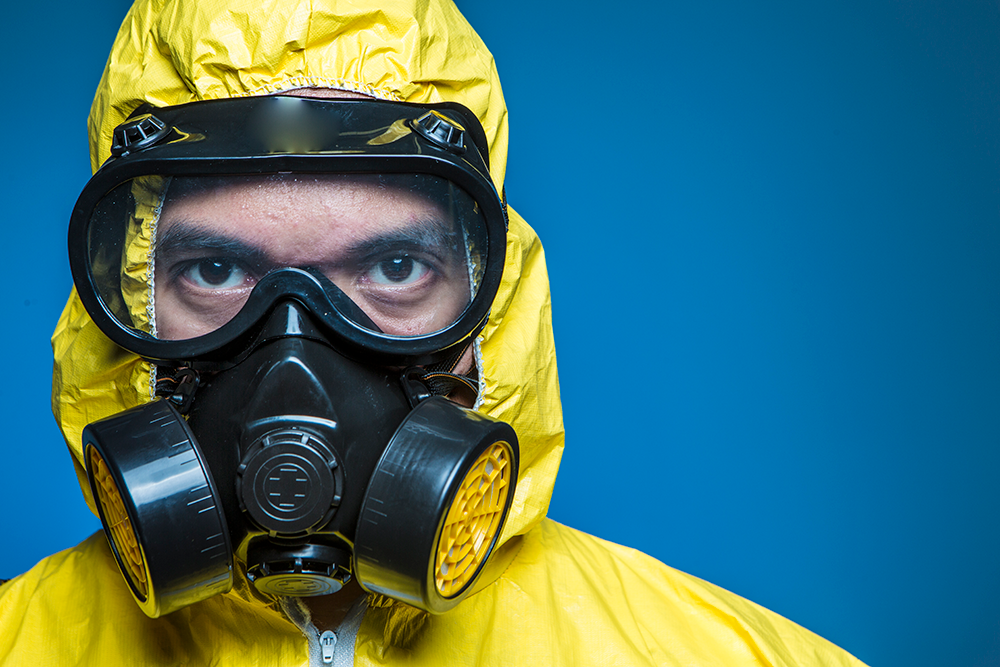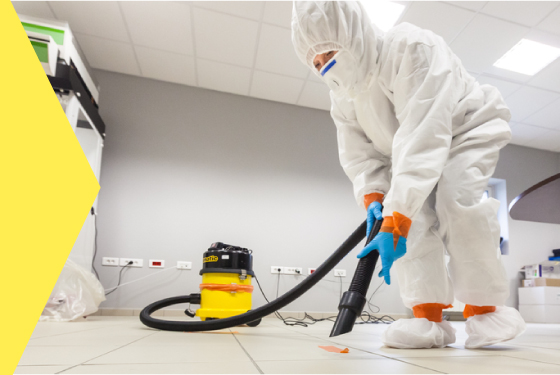Specialist Blood Cleanup: Ensuring Safe and Thorough Decontamination
Specialist Blood Cleanup: Ensuring Safe and Thorough Decontamination
Blog Article
Expert Biohazard Cleaning for Crime Scenes, Injury Incidents, and Polluted Areas
In the realm of expert biohazard cleanup, meticulous attention to information and adherence to safety and security methods are critical. As we dig into the intricacies of biohazard cleaning for these delicate atmospheres, a deeper understanding of the difficulties and vital procedures entailed will emerge, dropping light on the indispensable function of expert cleaning solutions in recovering safety and peace of mind.

Importance of Biohazard Cleanup
Biohazard clean-up complying with criminal offense scenes and trauma occurrences is important for ensuring the safety of individuals and the atmosphere. When these events occur, they frequently leave behind a variety of biohazards such as blood, physical fluids, and various other possibly contagious materials. These compounds can nurture hazardous microorganisms like infections and bacteria, posturing significant health and wellness dangers otherwise appropriately cleaned and sanitized.
Specialist biohazard clean-up services are educated to deal with these hazardous products safely and properly. They have the needed equipment, such as individual protective equipment and specialized cleaning up representatives, to completely decontaminate the influenced areas. By handing over the clean-up to experienced experts, individuals can prevent exposure to dangerous microorganisms and protect against the spread of contagious conditions.
Furthermore, proper biohazard cleaning is important for shielding the setting. Incorrect disposal of biohazardous products can contaminate dirt, water sources, and air, presenting a threat to wild animals and the community. By adhering to strict clean-up methods, professionals can guarantee that biohazards are securely gotten rid of and disposed of according to laws, reducing the danger of environmental contamination.
Kinds of Biohazards Encountered
Different harmful products commonly come across in criminal activity scenes and injury events present substantial health and wellness threats otherwise taken care of appropriately. Blood and physical fluids are among one of the most common biohazards found in these situations. These fluids can lug microorganisms such as HIV, hepatitis B and C, and various other unsafe microorganisms. Additionally, tissues, organs, and body parts can likewise present major health and wellness hazards because of possible contamination.
One more sort of biohazard usually run into is sharp things like needles, damaged glass, and other products that can trigger injuries and send infections. Chemical dangers are additionally a problem, as crime scenes might include substances like tear gas, pepper spray, or medication production products that call for customized handling and disposal procedures to avoid more injury.
In addition, mold and mildew and microorganisms development can occur in spaces where decay or prolonged exposure to wetness has occurred. These bacteria can launch toxic substances and irritants into the air, posturing respiratory system risks to those subjected. Overall, biohazard cleaning specialists need to be experienced and fully equipped to effectively take care of these different kinds of dangerous products to make sure the safety of themselves and others.
Devices and Safety Gear
When dealing with the critical task of taking care of biohazards experienced in crime scenes and trauma cases, the usage of correct equipment and safety gear is critical to making certain the security of people associated with the cleaning process. Personal safety equipment (PPE) such as handwear covers, coveralls, goggles, and masks are necessary to prevent direct call with potentially dangerous materials. Respirators are essential when taking care of biohazards that might come to be airborne, safeguarding employees from breathing in unsafe particles. Specialized cleaning tools like biohazard disinfectants, bags, and sharps containers are needed for the safe collection and disposal of polluted products. Additionally, heavy-duty equipment such as industrial-grade cleaner, foggers, and ozone generators may be called for to thoroughly sanitize the damaged area. Ensuring that all devices is effectively preserved, frequently examined, and utilized according to security standards is important in decreasing the threat of exposure to biohazards during cleanup procedures.
Cleaning Process and Strategies
Reliable and comprehensive cleaning of biohazardous materials from criminal activity scenes and trauma occurrences requires careful attention to detail and adherence to rigorous safety procedures. The cleaning procedure typically entails several essential steps. Originally, the area must be evaluated to figure out the degree of contamination and the proper cleaning techniques needed. Next off, all biohazardous materials, consisting of blood, bodily fluids, and tissue deposits, must be meticulously removed and taken care of according to regional guidelines.
Adhering to the elimination of biohazardous materials, the afflicted location goes through a thorough cleaning and disinfection process. This step involves making use of specialized cleaning up representatives and equipment to ensure that all traces of contamination are eliminated. After cleaning, the area is subjected to rigorous screening to validate that it is cost-free and risk-free of flood damage restoration any type of staying biohazards.

Purification and Disposal Procedures
To make sure extensive purification and proper disposal of biohazardous materials, adhering to the meticulous clean-up procedure, particular treatments must be thoroughly adhered to with rigorous adherence to security methods. Decontamination includes the elimination or neutralization of contaminants to reduce the danger of direct exposure and spread of hazardous compounds. This procedure typically includes cleansing, decontaminating, and sanitizing the affected area utilizing customized tools and EPA-approved chemicals.
Once decontamination is completed, proper disposal of biohazardous products is crucial to avoid further contamination or injury. Biohazardous waste, such as bodily fluids or blood-soaked materials, must be carefully accumulated, packaged, and classified according to governing standards. ATP testing. These materials are then transported to licensed centers for disposal with suitable channels, ensuring conformity with regional, state, and federal policies

Conclusion
Finally, specialist biohazard clean-up is vital for making sure the reliable and risk-free removal of hazardous products from crime scenes, trauma occurrences, and infected spaces. By utilizing specific tools, safety gear, and adhering to appropriate clean-up processes and methods, biohazard cleanup teams can properly get rid of and sanitize of biohazards, decreasing the threat of direct exposure and damage to people and the setting.
As we delve right into the details of biohazard cleanup for these sensitive environments, a deeper understanding of the challenges and vital treatments entailed will certainly arise, dropping light on the crucial duty of professional cleanup solutions in recovering safety and security and tranquility of mind.
Specialist biohazard cleaning solutions are trained to manage these dangerous materials safely and efficiently. By following strict cleaning methods, specialists can make certain that biohazards are securely eliminated and disposed of in accordance with policies, reducing the risk of ecological contamination.
Generally, biohazard clean-up professionals must be experienced and fully equipped to efficiently handle these various kinds of dangerous materials to make certain the security of themselves and others.
When dealing with the crucial job of managing biohazards experienced in crime scenes and injury occurrences, the usage of correct devices and protective equipment is critical to making certain the security of individuals entailed in the clean-up process.
Report this page